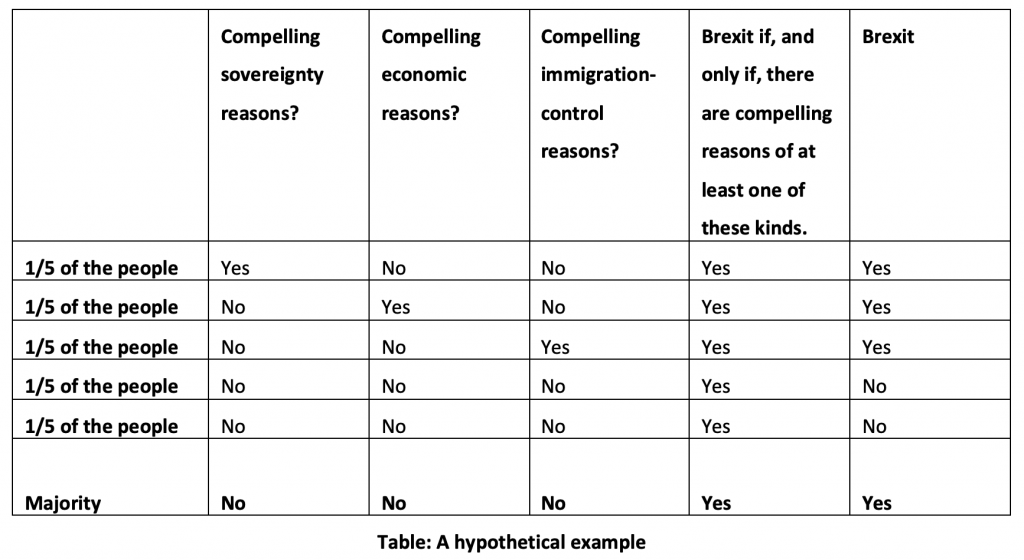Christian List looks at majoritarianism, Condorcet’s paradox and the UK’s decision to leave the EU.
The Prime Minister, Theresa May, has repeatedly asserted that Brexit is “the will of the British people”, and that the government, therefore, has a duty to “deliver” it. But is Brexit really the will of the British people? The Prime Minister assumes that “the will of the people” is to be defined as “the will of the majority”. The 2016 referendum, which produced a majority for Brexit, can then be interpreted as showing that Brexit is indeed the will of the British people. And although the referendum was officially only advisory, it was widely treated as if it were binding, and so it may seem to justify Theresa May’s stand.
But there are several complicating factors. First of all, the majority was narrow. There were 17.4 million votes for Leave, 16.1 million votes for Remain, and 12.9 million abstentions. A further 18 million people living in the UK were not on the electoral register, including all young people below the age of 18 and many long-term residents who are not citizens, though they contribute to British society and have a stake in it. So, although 17.4 million is a large number, it is only a relative majority, not an absolute one.
Secondly, at the time of the referendum, there was no shared vision as to what “Leave” actually meant. As we now know, there are several different versions of Brexit, and it is not clear which one voters had in mind. This problem was exacerbated by the fact that the pre-referendum campaigns were arguably not as deliberative, honest, and respectful as one might have hoped in light of the gravity of the decision at stake, and some issues that subsequently became central, such as the border in Northern Ireland, were insufficiently discussed. A widely accepted principle is that high-stakes decisions require as much information as possible and especially careful deliberation. Many people feel that this principle was insufficiently adhered to in the case of the referendum. Some potentially undeliverable or misleading promises were made. Interestingly, the search phrase “What is the EU” spiked on Google after, not before, the referendum (see, e.g., here). This raises questions about whether the referendum result would have been the same if the pre-referendum debate had been more deliberative.
A third complication is that the referendum – even when taken at face value – gave us only a snapshot of people’s wishes in June 2016, and we cannot presume that these wishes remain unchanged. So, at most, it might be argued, Brexit was the will of the people at the time of the referendum. This raises the question of whether its mandate comes with an expiry date or whether it could continue to guide policy if there were a shift in public opinion.
But even if we set all of these complications aside, there is still a much bigger, but less widely recognized challenge for the view that Brexit is the will of the people. It lies in the fact that the majoritarian definition of the popular will, uncritically adopted by the Prime Minister and many others, is not generally coherent.
The point is an old one, first noted by Nicolas de Condorcet in the 18th century, but it remains valid today. Condorcet’s insight was that the preferences of the majority may be incoherent even when all underlying individual preferences are entirely coherent. For a simple example, suppose there are three options to choose from. Call them A, B, and C. Suppose a third of the population prefers A over B over C; a second third prefers B over C over A; and a final third prefers C over A over B. Then there are majorities (of two thirds each) for A over B, for B over C, and yet for C over A. Every option is defeated by another option in a pairwise majority comparison. None of the options can qualify as “the majority will” here – a problem known as “Condorcet’s paradox”. And so, if the will of the people is defined as the will of the majority, then there may not be a coherent such will at all.
More concretely, some commentators have suggested that once we recognize that the UK’s choice is not simply one between Leave and Remain, but between several options, such as Soft Brexit, Hard Brexit, and Remain, we might indeed be faced with an instance of Condorcet’s paradox (see, e.g., here and here). For instance, one third of the people might prefer Soft Brexit over Remain over Hard Brexit (thinking that Brexit should be delivered but Hard Brexit would have bad consequences); a second third might prefer Remain over Hard Brexit over Soft Brexit (thinking that Soft Brexit is the worst of both worlds); and a final third might prefer Hard Brexit over Soft Brexit over Remain (thinking that the harder the Brexit, the better). Then each of the options would be majority-defeated by another, just as in the earlier abstract example.
But even if we consider just two options, Leave and Remain, a certain kind of majority incoherence can still occur. We may wish to arrive not only at a majority decision on whether to pursue Brexit, but also at some reasons for that decision that are themselves accepted by a majority. The following hypothetical example shows that the overall package of majority opinions may still be incoherent. Let us assume, for the sake of this example, that it is generally agreed that Brexit should be pursued if, and only if, there are either compelling sovereignty reasons for leaving the EU, or compelling economic reasons, or compelling immigration-control reasons (or, of course, more than one of the above). Suppose now that the individual opinions in the population are as shown in the table below.
Then a majority does indeed think that Brexit should be pursued. But every one of the possible reasons for Brexit is rejected by a majority. And yet there is unanimous agreement that Brexit should be pursued if, and only if, there are compelling reasons of at least one of the three specified kinds. Clearly, the overall package of majority opinions is incoherent in this example. (This problem is an instance of a more general “paradox of inconsistent majorities”, as discussed here.)
Now, emphatically, this is a hypothetical example, which is not based on real-world opinion polls, and I am using it only to illustrate a conceptual point. But I don’t think that the scenario is entirely far-fetched. The relative majority for Leave in the 2016 referendum may well have been an “incompletely theorized” one (adapting a concept introduced by the legal scholar Cass Sunstein). By an “incompletely theorized majority opinion”, I mean one that is not supported by any publicly agreed reasons, but that is underwritten by a patchwork of different, perhaps mutually inconsistent individual considerations none of which rises to the level of majority acceptability.
More broadly, the examples I have given, beginning with Condorcet’s paradox, show that if we define the “will of the people” in majoritarian terms, we cannot be sure that there is a coherent will that can be ascribed to the people. Of course, the problem of majority incoherence may not come to the surface in every situation in which we are trying to merge individual opinions into collective ones. But from a conceptual perspective, the fact that the “majority will” may be incoherent even when all individual wills are coherent should give some pause to those who uncritically define the popular will as the will of the majority (a point made forcefully by William Riker in a classic 1982 book, Liberalism against Populism).
In my own social-choice-theoretic work, building on the ideas of others such as Kenneth Arrow and Amartya Sen, I have shown that we are faced with a major trade-off when we try to define any such thing as a “collective will”. Specifically, our definition of the collective will cannot simultaneously satisfy three initially plausible desiderata:
- “robustness to pluralism”, which says that the collective will should be well-defined irrespective of how much disagreement there is about it in the relevant society;
- “majoritarianism”, which says that the collective will should be defined as the will of the majority; and
- “collective rationality”, which says that the collective will should not be incoherent.
I have described this problem as a “democratic trilemma”: no more than two of the three desiderata can be met at once (see here). To see how the desiderata can come into conflict, recall the example of Condorcet’s paradox, where there is a majority for A over B, a majority for B over C, and a majority for C over A. In such a case, which can easily occur in a pluralistic society, it is impossible both to respect the majority views and also to arrive at a coherent collective will. Something has to give.
Any democratic society must engage in careful deliberation to figure out, for each context and each decision problem at hand, how it can construct its “collective will” in the most democratically justifiable manner. There is no one-size-fits-all solution. Ideally, we would not wish to sacrifice too much robustness to pluralism, nor systematically to overrule majorities, nor to live with incoherent collective decisions. But the relative importance of the three desiderata may vary from context to context, and in making democratic decisions, we must arrive at compromises that strike the best balance between the different desiderata, while remaining publicly justifiable. Simply reducing “the will of the people” to “the will of the majority” will not generally work.
How should we move forward in relation to Brexit?
For a start, we should refrain from attaching the loaded label “the will of the people” to the outcome of the 2016 referendum and instead recognize that it was an elicitation of votes, on a vaguely defined proposal, at a certain point in time, among a certain participating electorate, following a certain pre-referendum debate about which many concerns have been raised. Secondly, although we cannot deny that the chosen decision procedure was simple majority voting, we should also acknowledge that, on more careful reflection, requiring more than just a simple majority for a decision with such far-reaching consequences would have been desirable. Generally, there are strong democratic reasons for requiring supermajorities – such as two thirds or more – for any decisions of major constitutional significance. In fact, in many countries, constitutional changes can only be made with supermajority support, often in bicameral settings.
That said, the referendum has taken place, it has generated expectations, and we certainly cannot pretend that it hasn’t happened. Understandably, many Members of Parliament are reluctant to overturn it without a strong democratic mandate, even if they sincerely think that Brexit is against the national interest. This is one of the reasons why Parliament is so badly gridlocked. A second referendum could adjudicate the matter. If there were another referendum, however, it should be preceded by an extensive process of deliberation, a process that is as inclusive, information-based, reasoned, and respectful as possible, perhaps with citizens’ assemblies and similar events as key ingredients. Moreover, the process would need to look not only at Brexit narrowly construed but also at the broader challenges the country faces. Democracy requires more than just a mere counting of votes.
Christian List is Professor of Philosophy and Political Science in LSE’s Department of Philosophy, Logic and Scientific Method and Department of Government. In 2011, he published Group Agency: The Possibility, Design, and Status of Corporate Agents (with Philip Pettit).
Featured image: Immanuel Giel / CC BY-SA 4.0 (cropped from original)





